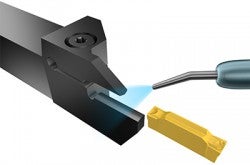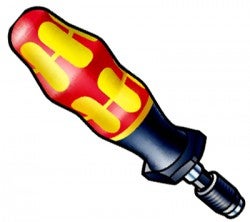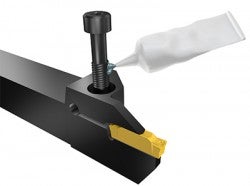Maintenance of parting and grooving tools
Establishing a routine for tool maintenance in the workshop will prevent problems and save money.
Check the insert seat
It is important to ensure that the insert seat has not been damaged during machining or handling. Make sure the insert seat is free from the dust or metal chips that are produced when machining. If necessary, clean the insert seat with compressed air. If CoroCut® SL blades are used, it is also important to check and clean the coupling between the head and the bar when changing the cutting head.

Torque wrench
To get the best performance out of screw-clamp tool holders, a torque wrench should be used to correctly tighten the insert. A too high torque will affect the performance of the tool negatively and cause insert and screw breakage. Torque that is too low will cause insert movement, vibrations and degrade the cutting result. Refer to the laser marking on each tool holder, or to the Main catalogue/Turning tools for the correct insert tightening torque (Nm).

Clamping screws
Use a torque wrench to tighten the screws to the correct torque. Change the insert clamping screw regularly. Apply sufficient screw lubrication to prevent the screw from seizing. Lubricant should be applied to the screw thread as well as the screw head face. Replace worn or damaged screws.

Tool maintenance
Establishing a routine for tool maintenance in the workshop will improve tool life... chevron_right
How to improve tool life in turning
The three main machining parameters when turning are speed, feed, and depth of cut.... chevron_right
Drilling tool maintenance and safety precautions
Drilling tool maintenance Use a torque screwdriver to ensure that the insert is... chevron_right
Tool set-up
Good quality in parting off and grooving is mainly dependent on the tool system and... chevron_right


